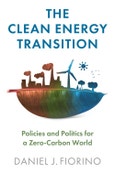Is the goal of a transition to clean energy at all realistic? If so, how could it be accomplished? Climate change poses a formidable challenge for twenty-first-century governments. Unless they can move to a clean energy system built on efficiency, renewables, electrification, and possibly complementary technologies like nuclear energy and carbon capture and storage, it will be all but impossible to avoid the worst impacts of climate change.
In this book, Daniel Fiorino provides a comprehensive introduction to the politics and policies of a clean energy transition and how it may unfold nationally and globally. Across its nine chapters, he explores the current energy landscape and the different pathways and pitfalls on the road to decarbonization. All scenarios for decarbonizing, he argues, rely on aggressive efficiency, the rapid scale-up of renewables, and the electrification of most of what is left. Yet this transition has to be accelerated and done effectively. There is little time left for second chances if we are to decarbonize later this century.
The Clean Energy Transition will be an indispensable resource for students of energy politics, environmental studies, and public policy, as well as anyone interested in the energy issues of the day.
Table of Contents
:List of Figures, Tables, and BoxesPreface
Chapter 1: The Energy Landscape
Chapter 2: Why Clean Energy Matters
Chapter 3: Getting the Carbon Out: Pathways to Decarbonization
Chapter 4: The Invisible Resource: Energy Efficiency
Chapter 5: Endless Flows: Renewable Energy
Chapter 6: Electrify Everything
Chapter 7: Hard Choices and an Opportunity: Nuclear, Carbon Capture, and Green Hydrogen
Chapter 8: Accelerating the Energy Transition
Chapter 9: The Clean Energy Future
Glossary
Notes
Index








